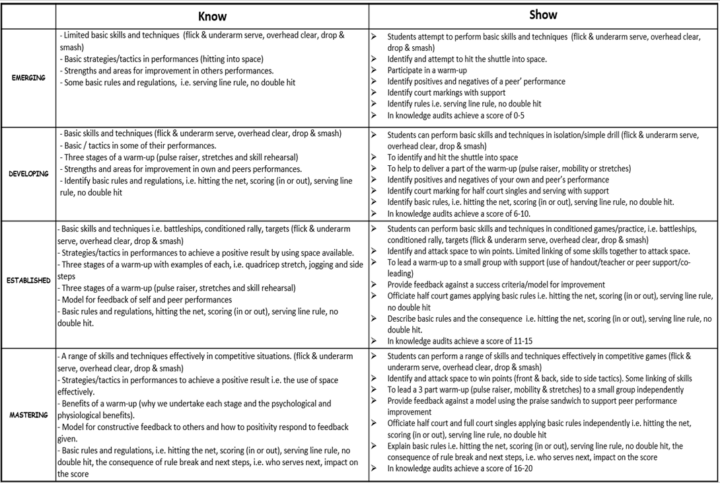KS3 Assessment and Reporting
Assessment and Reporting – Key Stage Three – A summary for parents
Aim:
At Key Stage 3 (Y7-9), our aim is to provide meaningful opportunities for assessment and feedback, which equip our students to know, remember and do more.
Age-Related-Expectations.
To achieve our aim, teachers are required to have an understanding of the age-related knowledge and skills that a child should have learnt at any point in their schooling.
It is the goal, in our schools, for all children to be working to at least the age-related expectation, and for many to be demonstrate mastery for each unit of work.
To help parents understand whether their son/daughter is making progress we use 4 simple words in all subjects at KS3:
Mastered/Mastering: Working above the age related expectations
Established: Working at age related expectation
Developing: Working towards age related expectation
Emerging: Below age related expectation
Every subject is different, and knowledge and skills will develop gradually over time.
Therefore, these broad bands are helpful to communicate holistically whether a student is making progress and meeting age-related expectation.
Formulating Age-Related Expectations.
At Nether Stowe School our staff have benefitted from collaborative working across the Arthur Terry Learning Partnership (Trust) which has enabled teachers to consider the age-related learning for each unit of work. Teachers reference the national curriculum as well as current and prior performance of students across the trust when deciding on this.
Through the design of our subject ‘Know’ (conceptual understanding) and ‘Show’ (procedural understanding) charts, teachers have a reference point of the age-related expectation for a unit of work, which will equip them to provide informed assessment and feedback to a student on how they might improve their work further. The Know and Show chart below illustrates an example of the criteria for a Y7 PE unit of work, on ‘badminton’.

Assessments with teacher feedback
Each term, the entire content of the Know and Show chart will be assessed through a teacher marked assessment called a ‘milestone’. Often these will take place during assessment weeks, however in some practical subjects this may not always be possible. Assessments can also take place outside of assessment weeks.
In addition to the larger milestone assessments students will also occasionally complete smaller assessments called ‘progress checks’. These are ungraded but serve to help teachers identify gaps in student’s knowledge.
All assessments are designed to reflect the expected content in the chart, and assessment literacy is considered to ensure that assessments are fair and equitable, e.g., students will be given the same amount of time and materials to revise from, and the conditions in which the assessment is conducted will be consistent across different classes.
In addition, it is our belief that mastery of a curriculum is more than a breadth of learning at any given point in time, but instead mastery is having the depth of learning to recall and then apply knowledge and skills over time. For this reason a minimum of 25% of the milestone assessment covers content from previous units of work taught that academic year, ensuring assessments are more linear than modular, while developing the recall strength of our student’s knowledge.
Reporting to parents
When reports go home to parents the following information will be communicated for each subject:
WAG (Working at grade)
ATL (Attitude to Learning)
Reading Age
Attendance (Overall, not by subject)
Deciding a Working At Grade (WAG):
A WAG will always be informed by a teacher’s professional judgement using the KNOW/SHOW criteria.
When deciding on a Working At Grade (WAG) for students staff will look to holistically place students into the different bands using the criteria.
In some subjects, following assessment weeks where a larger breadth of the curriculum has been assessed, subject leaders may use raw marks achieved in an assessment to determine a WAG grade using grade boundaries.
When reporting to parents teachers will use all data available to them however the grade arrived at will be weighted heavily on the data gathered during the school’s assessment weeks.
Deciding an ATL:
This is teacher’s professional judgement and defined as:
- Superb. Meets all expectations most of the time
- Motivated. Meets most expectations most of the time
- Passive. Meets some expectations most of the time
- Serious concerns. Meets very few expectations most of the time
How do make sense of the report so I can help my son/daughter do better?
On the school’s website you will find a summary of each subject’s content:
Curriculum Overview – Nether Stowe School
Your son/daughter will have access to the following information for each subject:
- A copy of their assessment
- A copy of their assessment feedback
- A copy of a knowledge organiser which contains a summary of what they have learned.
- On Showbie, in their lessons, each lesson will also have a ‘Key Knowledge Slide’ which gives a summary of the key factual knowledge in each lesson.
The best input from parents will be to make sure that your son/daughter knows what they must do to improve. Ask them:
- What did you do well in your assessment?
- What could you have done better?
- Can you show me how to do this better next time?
If your son/daughter cannot answer any one of these questions the answer will be in the assessment feedback lesson activities. If you or they are still unsure then please contact the school.

